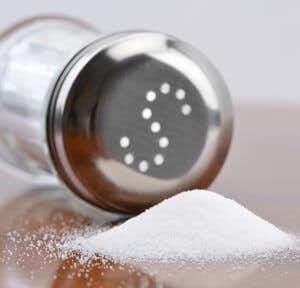
For decades, public health experts have been exhorting Americans to eat less salt. This is supposed to reduce their risk of high blood pressure and heart disease. Have food manufacturers succeeded in cutting back on salt in packaged food? Are Americans buying low-sodium products?
New research shows that packaged food purchased in 2014 had significantly less sodium than that in the grocery bags in 2000 (JAMA Internal Medicine, online June 5, 2017). The scientists used data from the Nielsen Homescan Consumer Panel. Approximately 170,000 households participated nationwide during this time, scanning every package of food they bought. The bar codes allowed the investigators to calculate how much sodium was in each food per person it was serving.
They concluded that there has been a 12 percent decline in sodium content during this time, dropping per capita sodium by almost 400 mg per person per day. We think that is actually pretty impressive. The authors of the article noted:
“Moreover, the sodium content of households’ purchases decreased significantly for all top food sources of sodium between 2000 and 2014, including declines of more than 100 mg/100 g for condiments, sauces, and dips and salty snacks.”
Raining on the Cutting Back on Salt Parade:
The authors seemed less thrilled with their results:
“Although a significant 15-year reduction in the median sodium density of households’ packaged food and beverage purchases was achieved, almost all US households had purchases exceeding optimal sodium density levels. In summary, sodium in US households’ packaged food purchases decreased significantly and consistently for all 3 measures examined (mg/d, mg/100 g, and mg/1000 kcal), but further reductions are needed.”
The authors go on to suggest that most US households are still getting more sodium than experts consider healthy and further reductions are needed.
The Sodium Controversy Continues:
Franz Messerli, MD, is one of the world’s foremost researchers in the field of hypertension. He graduated from Bern Medical School in Switzerland and has spent decades in the United States as a highly regarded investigator. He is professor of medicine at the Icahn School of Medicine at Mount Sinai Health System and directed the hypertension program at St. Luke’s Roosevelt Hospital.
In a commentary published in the American Journal of Medicine (April, 2017) titled “Salt, Tomato Soup, and the Hypocrisy of the American Heart Association,” Dr. Messerli and his colleagues point out that a controversial study by Mente, et al concluded:
“that a reduction of dietary sodium is beneficial in high salt eaters who also have high blood pressure. However, in people with normal blood pressure, lowering salt intake has little if any effect and may even be harmful when becoming too severe.”
Dr. Messerli goes on to criticize the American Heart Association:
“This is the same AHA that for years has accepted fees to uncritically endorse as ‘heart healthy’ scores of products by the Campbell Soup Company (Camden, NJ), products that contain far more salt than the AHA itself recommends for a heart-healthy diet. Specifically, the AHA recommended that consumers shouldn’t eat more than 1500 mg of sodium per day, and also preferentially choose low-sodium foods defined as having <140 mg of sodium per serving. Campbell’s AHA-certified products contained around 400 mg per serving, or between 600 and 1000 mg per unit, far from the AHA’s suggestions.”
Finally, Dr. Messerli and his co-authors summarize, in our opinion, the salt issue quite thoughtfully:
“Understandably, the AHA, despite its hypocritical endorsing policy, is unwilling to acknowledge that universal salt restriction may be controversial, that indeed the relationship between salt intake and heart disease may be far more complex than we originally thought. Perhaps, then, the AHA should take to heart the dictum of H. L. Mencken:
‘For every complex problem there is an answer that is clear, simple, and wrong.'”
Want to learn more about the controversy swirling around cutting back on salt? Here is a link to the complexity of this seemingly “simple” story:

